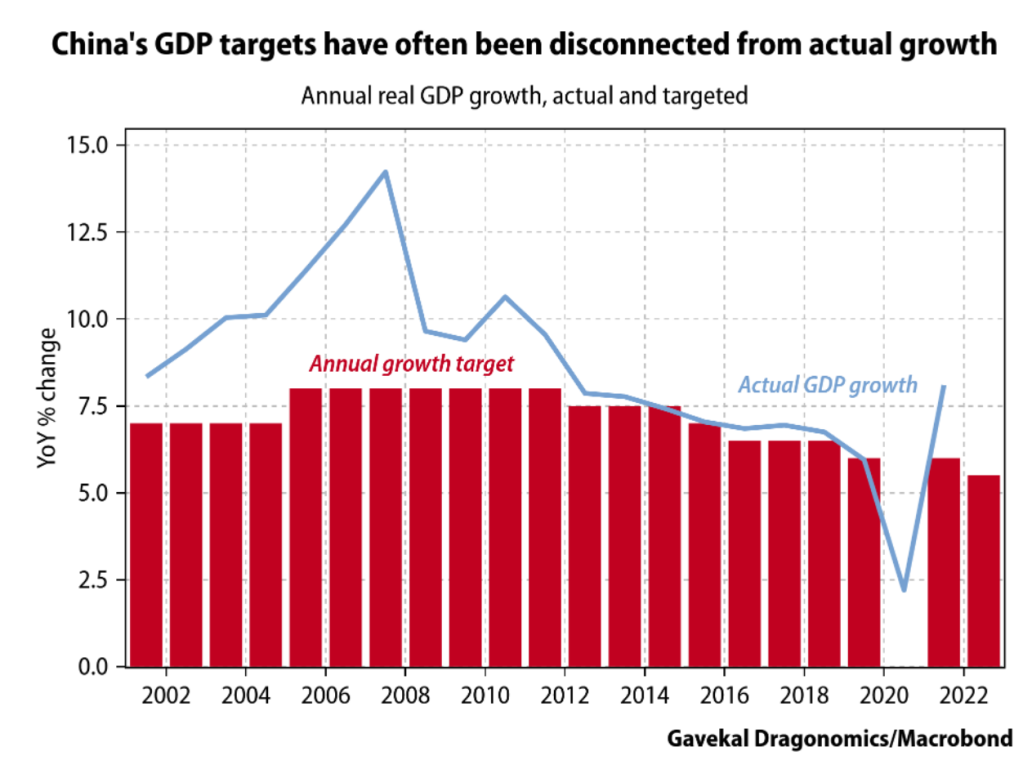These are not good times for the credibility of China’s GDP growth targets. Just weeks after unveiling an ambitious target of 5.5% real GDP growth for 2022, the central government effectively ensured that target will not be met by requiring local governments to impose strict lockdowns to contain the spread of Covid-19. The restrictions cover most of China’s major cities, have had a clear negative impact on economic activity in March that will only worsen in April.
https://andrewbatson.com/2022/04/18/why-gdp-growth-targets-are-underrated/
So begins a thought provoking blog post on China’s growth prospects for this year, written by Andrew Batson. I’m a very (very!) amateur student of China, and follow a more or less random group of people on topics related to China – but Andrew Batson’s blog, I think, should definitely be on everybody’s list.
This one speaks about growth prospects in China this year, but so much else besides. Let’s learn a little bit about China by parsing through it.
The first point that he makes is that growth targets this year are all but likely to be missed. This, of course, is because of the lockdowns in Shanghai and other parts, and pretty much everybody knows that they’re not going well – and that’s putting it mildly. Targets were missed last year, and the year before – so why, one might be entitled to ask, should one have them at all in the first place?
There’s shades of Goodhart’s Law in the paragraphs that follow, and when I read the piece the first time, my blogging antennae were up. Aha, I thought to myself, one more post in an ever increasing canon. But the post then moves in (for me) an entirely unexpected direction, and in a way that makes it even more interesting.
Targeting GDP growth, Batson says, is not A Perfect Thing, but is, all things considered, Still A Good Thing Given The Alternatives.

One way to understand Batson’s defense of GDP growth targets is by internalizing what I think is his key point: giving up on a GDP growth target doesn’t mean there will be no targets – it simply means there won’t be economic growth targets.
That is to say (and this is my understanding of his point), it’s not as if giving up on GDP growth targets will mean a very laissez faire approach to the economy. Instead, China will be set other, non-economic targets. Such as what, you ask?
…“regulatory storm” of 2021 with its multitude of highly interventionist policies aiming to reshape entire industries. Limiting the power of large private companies was even a fairly explicit goal: it’s probably not a coincidence that the main targets of last year’s political-regulatory campaigns were real estate and the internet, the two economic sectors that have created the biggest private-sector fortunes. All of this was certainly enabled by Xi’s dictum that there are more important things than GDP growth. The costs and economic downsides of the regulatory storm were put aside in favor of other goals.
https://andrewbatson.com/2022/04/18/why-gdp-growth-targets-are-underrated/
Regular listeners of Amit Varma’s excellent podcast, TSATU will no doubt be aware of the line “Politics is downstream from culture”. The quote is originally by Breitbart, of course, as Amit always points out. The reason I bring it up over here is because economic growth, if you ask me, is downstream of politics. In this framing, economic growth serves political needs, and those political needs are downstream of culture.
Rarely does one get to quote Brietbart in one paragraph and then follow it up with a supporting quote that references Lenin, but hey, welcome to 2022:
…China’s Leninist political system, which is organized around mobilizing officials to direct social transformation. As Ken Jowitt put it: “The definitional tendency of Leninist regimes [is] their attempts to control and specify the substantive dimensions of social developments, not merely the framework within which such developments occur.”
https://andrewbatson.com/2022/04/18/why-gdp-growth-targets-are-underrated/
As Andrew Batson goes on to argue in the following paragraphs, de-emphasizing growth targets in a liberal political framework is very different from de-emphasizing them in a Chinese set-up. The focus on growth for its own sake is very different from the focus on growth to serve other aims. Batson argues that Deng Xiaoping was optimizing for economic growth, and that Xi Jingping is optimizing for national greatness. National greatness includes, but never as a primary target, economic growth.
But that pursuit of national greatness, perhaps, has been taken too far in Chin’s case:
In December, when when Xi chaired the annual Central Economic Work Conference, the signal was clear: the priority is now the “stability” of the economy.
https://andrewbatson.com/2022/04/18/why-gdp-growth-targets-are-underrated/
Since then, various political slogans and campaigns have been much less in evidence and the focus has been on more practical short-term measures. Senior officials have even promised not to introduce policies that “adversely affect market expectations”–effectively admitting that they had been doing just that in the recent past.
I’ve said it before, and I’ll say it again, and this is applicable to individuals as much as it is to nations. Be very clear about the answer to that irritatingly simple question:
